人教八下Unit 3 Could you please clean your room? Review课件(共22张PPT)
文档属性
| 名称 | 人教八下Unit 3 Could you please clean your room? Review课件(共22张PPT) | 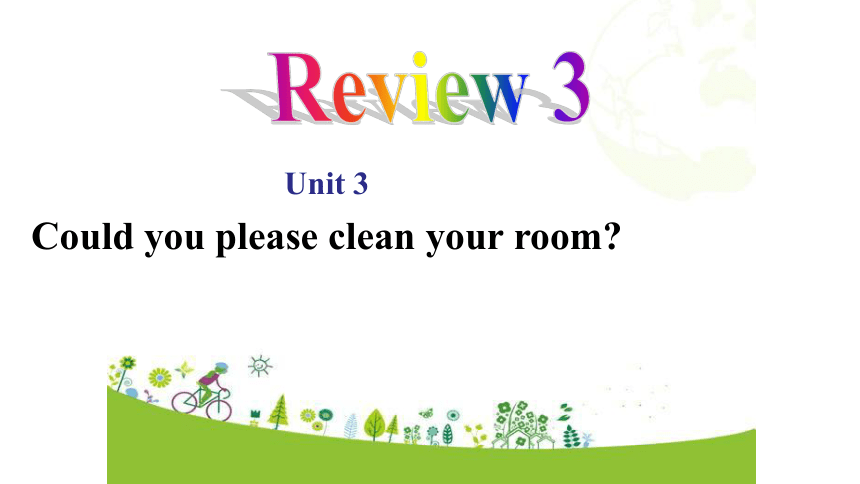 | |
| 格式 | zip | ||
| 文件大小 | 580.5KB | ||
| 资源类型 | 教案 | ||
| 版本资源 | 人教新目标(Go for it)版 | ||
| 科目 | 英语 | ||
| 更新时间 | 2020-04-10 19:30:15 | ||
图片预览

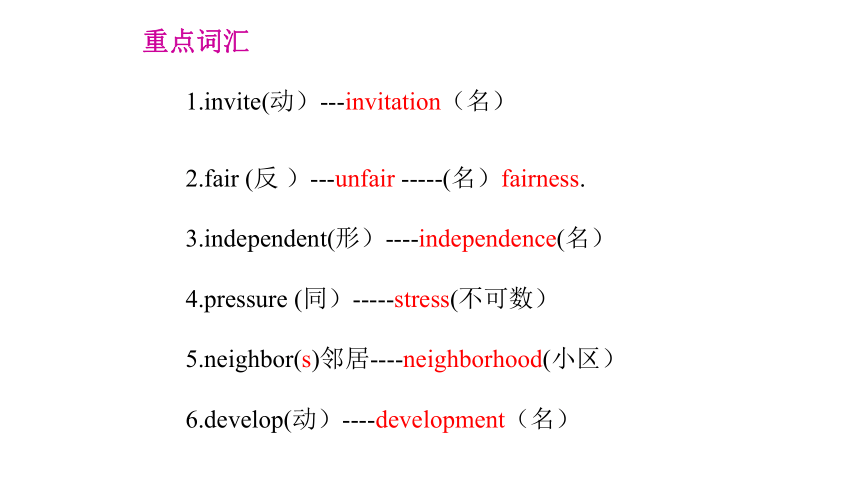
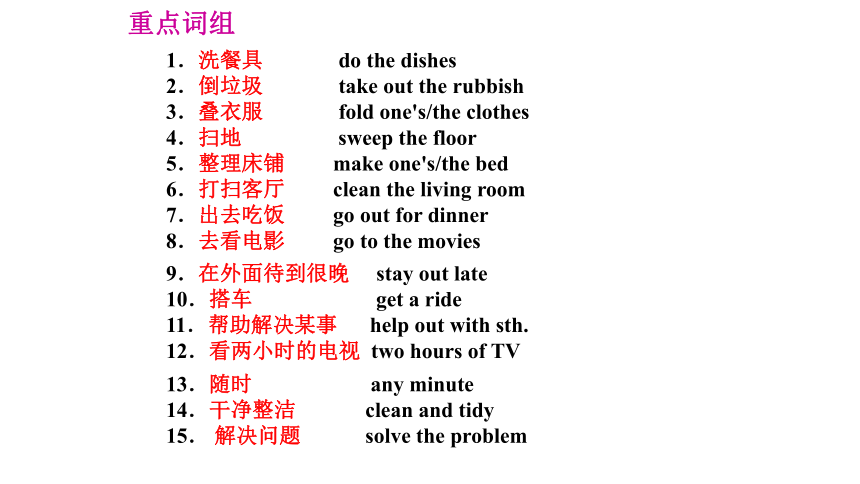
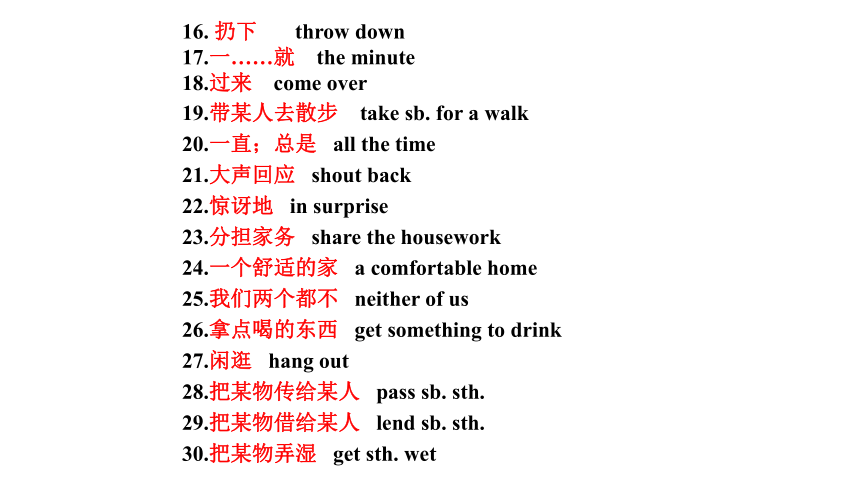
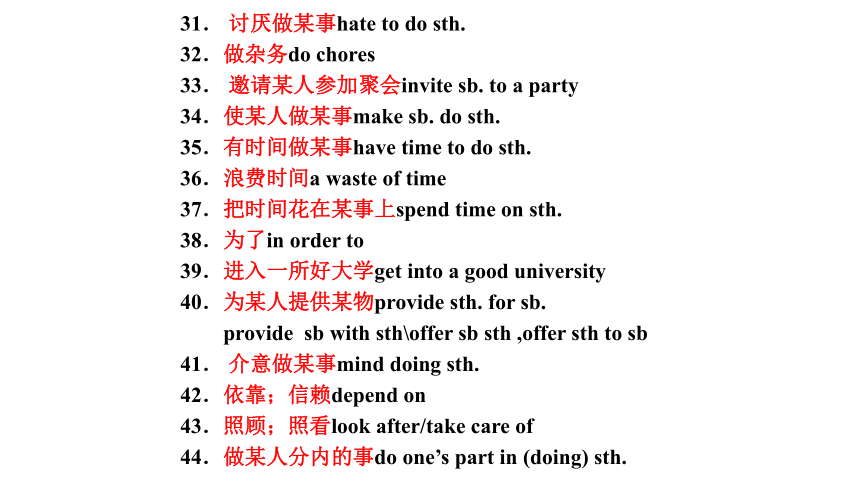
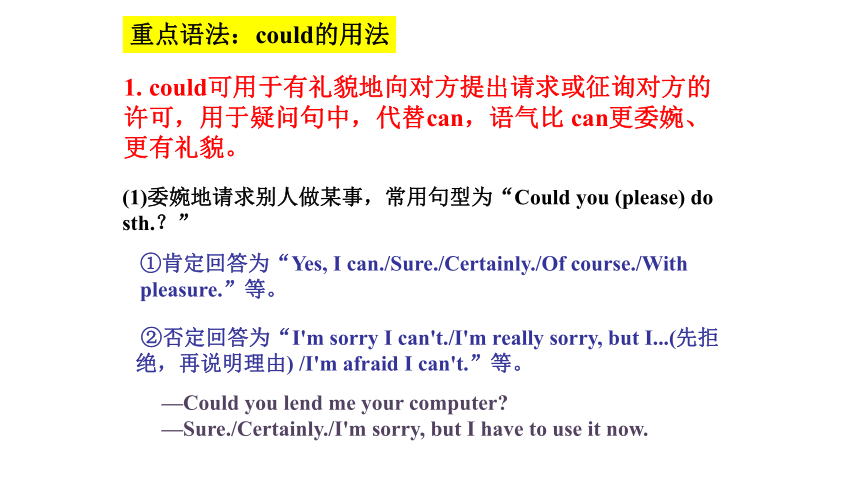
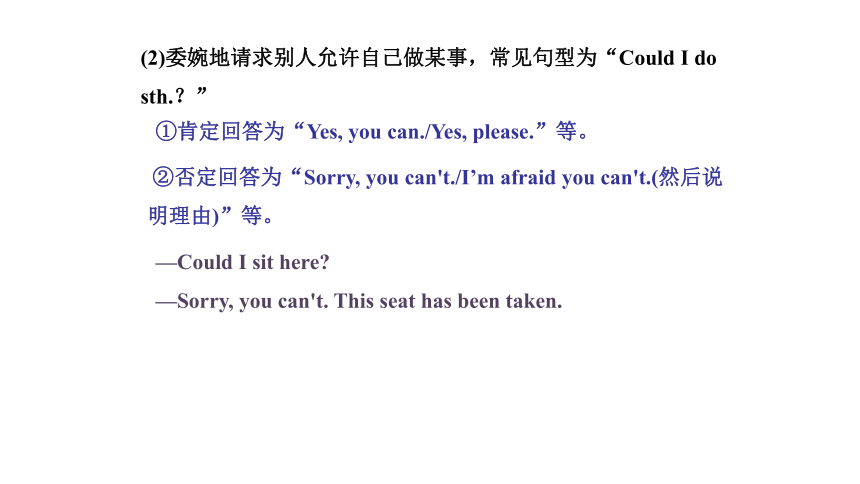
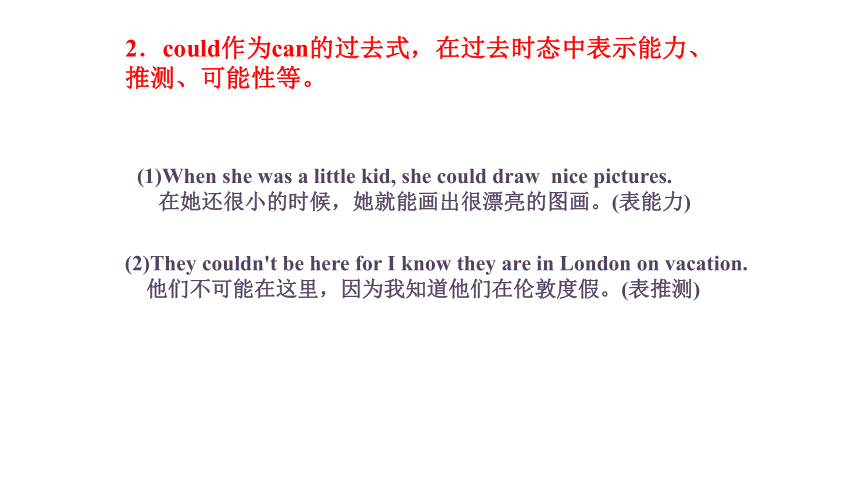
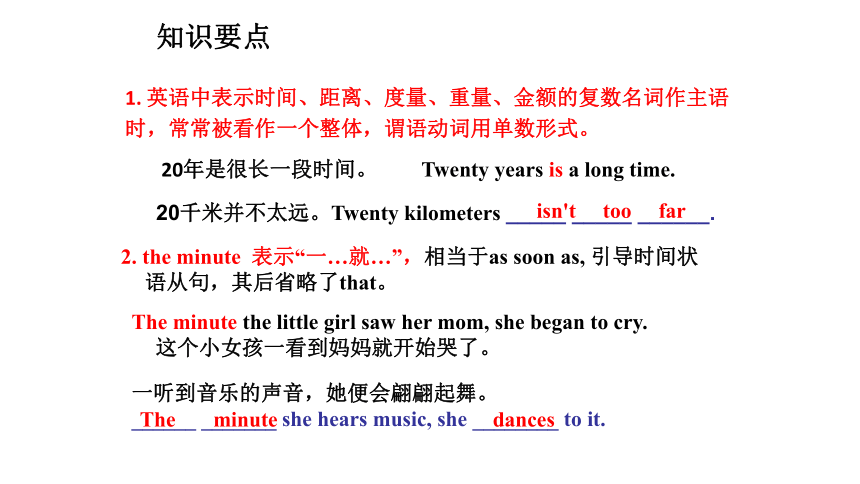
文档简介
(共22张PPT)
Unit 3
Could you please clean your room?
重点词汇
1.invite(动)---invitation(名)
2.fair (反 )---unfair -----(名)fairness.
3.independent(形)----independence(名)
4.pressure (同)-----stress(不可数)
5.neighbor(s)邻居----neighborhood(小区)
6.develop(动)----development(名)
重点词组
1.洗餐具 do the dishes
2.倒垃圾 take out the rubbish
3.叠衣服 fold one's/the clothes
4.扫地 sweep the floor
5.整理床铺 make one's/the bed
6.打扫客厅 clean the living room
7.出去吃饭 go out for dinner
8.去看电影 go to the movies
9.在外面待到很晚 stay out late
10.搭车 get a ride
11.帮助解决某事 help out with sth.
12.看两小时的电视 two hours of TV
13.随时 any minute
14.干净整洁 clean and tidy
15. 解决问题 solve the problem
16. 扔下 throw down
17.一……就 the minute
18.过来 come over
19.带某人去散步 take sb. for a walk
20.一直;总是 all the time
21.大声回应 shout back
22.惊讶地 in surprise
23.分担家务 share the housework
24.一个舒适的家 a comfortable home
25.我们两个都不 neither of us
26.拿点喝的东西 get something to drink
27.闲逛 hang out
28.把某物传给某人 pass sb. sth.
29.把某物借给某人 lend sb. sth.
30.把某物弄湿 get sth. wet
31. 讨厌做某事hate to do sth.
32.做杂务do chores
33. 邀请某人参加聚会invite sb. to a party
34.使某人做某事make sb. do sth.
35.有时间做某事have time to do sth.
36.浪费时间a waste of time
37.把时间花在某事上spend time on sth.
38.为了in order to
39.进入一所好大学get into a good university
40.为某人提供某物provide sth. for sb.
provide sb with sth\offer sb sth ,offer sth to sb
41. 介意做某事mind doing sth.
42.依靠;信赖depend on
43.照顾;照看look after/take care of
44.做某人分内的事do one’s part in (doing) sth.
1. could可用于有礼貌地向对方提出请求或征询对方的许可,用于疑问句中,代替can,语气比 can更委婉、更有礼貌。
(1)委婉地请求别人做某事,常用句型为“Could you (please) do sth.?”
①肯定回答为“Yes, I can./Sure./Certainly./Of course./With pleasure.”等。
②否定回答为“I'm sorry I can't./I'm really sorry, but I...(先拒绝,再说明理由) /I'm afraid I can't.”等。
—Could you lend me your computer?
—Sure./Certainly./I'm sorry, but I have to use it now.
重点语法:could的用法
(2)委婉地请求别人允许自己做某事,常见句型为“Could I do sth.?”
①肯定回答为“Yes, you can./Yes, please.”等。
②否定回答为“Sorry, you can't./I’m afraid you can't.(然后说明理由)”等。
—Could I sit here?
—Sorry, you can't. This seat has been taken.
2.could作为can的过去式,在过去时态中表示能力、推测、可能性等。
(1)When she was a little kid, she could draw nice pictures.
在她还很小的时候,她就能画出很漂亮的图画。(表能力)
(2)They couldn't be here for I know they are in London on vacation.
他们不可能在这里,因为我知道他们在伦敦度假。(表推测)
1. 英语中表示时间、距离、度量、重量、金额的复数名词作主语时,常常被看作一个整体,谓语动词用单数形式。
20年是很长一段时间。 Twenty years is a long time.
20千米并不太远。Twenty kilometers _____ _____ ______.
isn't too far
2. the minute 表示“一…就…”,相当于as soon as, 引导时间状语从句,其后省略了that。
The minute the little girl saw her mom, she began to cry.
这个小女孩一看到妈妈就开始哭了。
一听到音乐的声音,她便会翩翩起舞。
______ _______ she hears music, she ________ to it.
The minute dances
知识要点
3. in order to do sth.意为“为了做某事”,表示目的,其位置在句首和句中均可。否定结构为:in order not to do sth.。
In order to get better grades in exams, he studied even harder.
为了在考试中取得更好的成绩,他学习更努力了。
In order that her mother can have more time to rest, she often helps with the housework.
为了让妈妈多休息一会,她经常帮着干家务活。
拓展:
in order that 也意为“为了”,其后常接一个句子。
Tony got up early this morning in order ___________ (catch) the early bus.
to catch
4. There’s no need for sb. to do sth.
意为“对某人来说做某事是没有必要的”。
我认为他们没必要为这件事吵架。
I think _______ ____ no need _______ ______ _____ argue about the thing.
there is for them to
5. It is+adj.+(for sb.) to do sth.
意为“(某人)做某事是……的”。
It’s very hard for him to study two languages.
对他来说学两门外语是很难的。
小孩子们单独去河里游泳是很危险的。
_____ _____ very dangerous ______ ____________
to swim in rivers alone.
It is for kids/children
it是形式主语,后面的不定式结构是真正的主语。for后面的sb.是不定式的逻辑主语。
6. throw的用法
throw是动词, 意为“扔;掷”, 过去式是threw, 过去分词是thrown。
I threw a ball to her and she caught it.
我把球扔给她, 她接住了。
throw down
扔下 He threw down the book and went away.
throw at
扔向;掷向 She looked around the kitchen for something
to throw at the dog.
throw away
扔掉;丢弃 It is a waste to throw away good food.
—I don't like pop music. 我不喜欢流行音乐。
—Neither do I. 我也不喜欢。
7. neither 引导的倒装句
“neither+助动词/be动词/情态动词+主语”,
表示“…也不”。
结构 用法
so+助动词/be动词/情态动词+主语 当前面叙述的肯定事实也适用于后者时
neither+助动词/be动词/情态动词+主语 当前面叙述的否定事实也适用于后者时
eg. I didn't go to the zoo last weekend.
Neither did I.
I can't finish the work in time.
Neither can Bob.
Alice visited HangZhou yesterday.
So did I
8.. depend on 依靠;信赖
Health depends on good food, fresh air and enough sleep.
健康依靠的是好的食物、新鲜的空气和充足的睡眠。
9. as a result 结果;因此, 其中result作名词, 意为“结果”。
Mike didn't give up his dream. As a result, his dream
came true.
迈克没有放弃他的梦想。结果, 他的梦想实现了。
他学习不用功, 结果考试不及格。
He didn't study hard. As a result , he failed his exam.
11. both, neither, either, all, none, any
both 意为“两者都”,用于两者之间,可以和and搭配,
both...and...表示“…和…都”
neither neither是both的全部否定形式,表示“两个都不”。
可以和nor搭配, neither...nor...表示“…和…都不”
either 表示“两个人或物中的任何一个”。可以和or搭配,
either...or...表示“或者…或者…;要么…要么…”
all 意为“全部”,用于三者或三者以上的人或物
none none是all的全部否定形式, 意为“没有一个”
any 表示“三个或三个以上人或物中的任何一个”。
12. borrow, lend, keep
Do you often ___________ books from the library?
你经常从图书馆借书吗?
Thank you very much for _________ it to me.
非常感谢你把它借给了我。
—How long can I _________ the books?
这些书我可以借多长时间?
—For two weeks.两周。
borrow
lending
keep
borrow 表示“借;借来;借入”,指向别人借来东西,常见的搭配是borrow sth.from sb.
lend 表示“借给;借出”,指把东西借给别人,常见的搭配是lend sb.sth.或lend sth.to sb.
keep 表示“长时间地借用”,可以和时间段以及
how long搭配
常用句型:
The students in our class have different ideas about ...
Some parents think ...
These years, some students are interested in ...
I like ... but I hate ...
Firstly, ... Secondly, ... Thirdly, ...
In my opinion ...
In a word ...
话题写作:
本单元的话题是“家务琐事与许可”,要求围绕这一话题,能用should/shouldn’t谈论自己对做家务的看法,学会分担家务,促进与家庭成员之间的情感交流。写作体裁以议论文为主。
议论文有三要素:论点、论据和论证。
议论文通常的结构:
1. 首先在开篇部分,直接提出要讨论的问题;
2. 然后在正文部分,对所提问题进行事例论证;
3. 最后在结尾部分,总结、归纳,并提出正确的观点。
思路点拨:
1. 开篇点题:列出家长的做法并表明自己的观点—做家务对孩子有好处。
don’t let kids do any chores, the only thing is to study well, it’s good for kids
2. 展开论证:用事实展开具体的论证—做家务具体的好处。
make us independent, relax ourselves from hard work, understand ... better
3. 总结归纳:再次表明自己的观点—学生应该适当做家务。
students should do some chores
写作实例
在现实生活中,有不少父母总怕做家务会浪费孩子的时间,影响孩子学习,因此宁可自己家务全包也不让孩子动手,哪怕是举手之劳。
你同意这种做法吗?你认为中学生在家里应该做一些家务吗?请写一篇论文,谈谈你的看法。
注意:1. 观点明确,语句连贯、通顺;
2.词数100左右;短文的开头已给出(不计入总词数)。
Do you think a middle school student should do chores at home?
One possible version:
Do you think a middle school student should do chores at home? In our daily life, some parents think that students should study in their free time. They don’t let their kids do any chores. They think the only thing kids need to do is to study well. I disagree with it. I think it’s good for kids to do some chores.
Firstly, doing some chores at home can make us independent. We can’t depend on our parents forever. So we should learn to do some chores. Secondly, we can relax ourselves from hard work at school. Thirdly, when we do chores at home, we can also understand our parents better.
In a word, I think students should do some chores in their free time.
Unit 3
Could you please clean your room?
重点词汇
1.invite(动)---invitation(名)
2.fair (反 )---unfair -----(名)fairness.
3.independent(形)----independence(名)
4.pressure (同)-----stress(不可数)
5.neighbor(s)邻居----neighborhood(小区)
6.develop(动)----development(名)
重点词组
1.洗餐具 do the dishes
2.倒垃圾 take out the rubbish
3.叠衣服 fold one's/the clothes
4.扫地 sweep the floor
5.整理床铺 make one's/the bed
6.打扫客厅 clean the living room
7.出去吃饭 go out for dinner
8.去看电影 go to the movies
9.在外面待到很晚 stay out late
10.搭车 get a ride
11.帮助解决某事 help out with sth.
12.看两小时的电视 two hours of TV
13.随时 any minute
14.干净整洁 clean and tidy
15. 解决问题 solve the problem
16. 扔下 throw down
17.一……就 the minute
18.过来 come over
19.带某人去散步 take sb. for a walk
20.一直;总是 all the time
21.大声回应 shout back
22.惊讶地 in surprise
23.分担家务 share the housework
24.一个舒适的家 a comfortable home
25.我们两个都不 neither of us
26.拿点喝的东西 get something to drink
27.闲逛 hang out
28.把某物传给某人 pass sb. sth.
29.把某物借给某人 lend sb. sth.
30.把某物弄湿 get sth. wet
31. 讨厌做某事hate to do sth.
32.做杂务do chores
33. 邀请某人参加聚会invite sb. to a party
34.使某人做某事make sb. do sth.
35.有时间做某事have time to do sth.
36.浪费时间a waste of time
37.把时间花在某事上spend time on sth.
38.为了in order to
39.进入一所好大学get into a good university
40.为某人提供某物provide sth. for sb.
provide sb with sth\offer sb sth ,offer sth to sb
41. 介意做某事mind doing sth.
42.依靠;信赖depend on
43.照顾;照看look after/take care of
44.做某人分内的事do one’s part in (doing) sth.
1. could可用于有礼貌地向对方提出请求或征询对方的许可,用于疑问句中,代替can,语气比 can更委婉、更有礼貌。
(1)委婉地请求别人做某事,常用句型为“Could you (please) do sth.?”
①肯定回答为“Yes, I can./Sure./Certainly./Of course./With pleasure.”等。
②否定回答为“I'm sorry I can't./I'm really sorry, but I...(先拒绝,再说明理由) /I'm afraid I can't.”等。
—Could you lend me your computer?
—Sure./Certainly./I'm sorry, but I have to use it now.
重点语法:could的用法
(2)委婉地请求别人允许自己做某事,常见句型为“Could I do sth.?”
①肯定回答为“Yes, you can./Yes, please.”等。
②否定回答为“Sorry, you can't./I’m afraid you can't.(然后说明理由)”等。
—Could I sit here?
—Sorry, you can't. This seat has been taken.
2.could作为can的过去式,在过去时态中表示能力、推测、可能性等。
(1)When she was a little kid, she could draw nice pictures.
在她还很小的时候,她就能画出很漂亮的图画。(表能力)
(2)They couldn't be here for I know they are in London on vacation.
他们不可能在这里,因为我知道他们在伦敦度假。(表推测)
1. 英语中表示时间、距离、度量、重量、金额的复数名词作主语时,常常被看作一个整体,谓语动词用单数形式。
20年是很长一段时间。 Twenty years is a long time.
20千米并不太远。Twenty kilometers _____ _____ ______.
isn't too far
2. the minute 表示“一…就…”,相当于as soon as, 引导时间状语从句,其后省略了that。
The minute the little girl saw her mom, she began to cry.
这个小女孩一看到妈妈就开始哭了。
一听到音乐的声音,她便会翩翩起舞。
______ _______ she hears music, she ________ to it.
The minute dances
知识要点
3. in order to do sth.意为“为了做某事”,表示目的,其位置在句首和句中均可。否定结构为:in order not to do sth.。
In order to get better grades in exams, he studied even harder.
为了在考试中取得更好的成绩,他学习更努力了。
In order that her mother can have more time to rest, she often helps with the housework.
为了让妈妈多休息一会,她经常帮着干家务活。
拓展:
in order that 也意为“为了”,其后常接一个句子。
Tony got up early this morning in order ___________ (catch) the early bus.
to catch
4. There’s no need for sb. to do sth.
意为“对某人来说做某事是没有必要的”。
我认为他们没必要为这件事吵架。
I think _______ ____ no need _______ ______ _____ argue about the thing.
there is for them to
5. It is+adj.+(for sb.) to do sth.
意为“(某人)做某事是……的”。
It’s very hard for him to study two languages.
对他来说学两门外语是很难的。
小孩子们单独去河里游泳是很危险的。
_____ _____ very dangerous ______ ____________
to swim in rivers alone.
It is for kids/children
it是形式主语,后面的不定式结构是真正的主语。for后面的sb.是不定式的逻辑主语。
6. throw的用法
throw是动词, 意为“扔;掷”, 过去式是threw, 过去分词是thrown。
I threw a ball to her and she caught it.
我把球扔给她, 她接住了。
throw down
扔下 He threw down the book and went away.
throw at
扔向;掷向 She looked around the kitchen for something
to throw at the dog.
throw away
扔掉;丢弃 It is a waste to throw away good food.
—I don't like pop music. 我不喜欢流行音乐。
—Neither do I. 我也不喜欢。
7. neither 引导的倒装句
“neither+助动词/be动词/情态动词+主语”,
表示“…也不”。
结构 用法
so+助动词/be动词/情态动词+主语 当前面叙述的肯定事实也适用于后者时
neither+助动词/be动词/情态动词+主语 当前面叙述的否定事实也适用于后者时
eg. I didn't go to the zoo last weekend.
Neither did I.
I can't finish the work in time.
Neither can Bob.
Alice visited HangZhou yesterday.
So did I
8.. depend on 依靠;信赖
Health depends on good food, fresh air and enough sleep.
健康依靠的是好的食物、新鲜的空气和充足的睡眠。
9. as a result 结果;因此, 其中result作名词, 意为“结果”。
Mike didn't give up his dream. As a result, his dream
came true.
迈克没有放弃他的梦想。结果, 他的梦想实现了。
他学习不用功, 结果考试不及格。
He didn't study hard. As a result , he failed his exam.
11. both, neither, either, all, none, any
both 意为“两者都”,用于两者之间,可以和and搭配,
both...and...表示“…和…都”
neither neither是both的全部否定形式,表示“两个都不”。
可以和nor搭配, neither...nor...表示“…和…都不”
either 表示“两个人或物中的任何一个”。可以和or搭配,
either...or...表示“或者…或者…;要么…要么…”
all 意为“全部”,用于三者或三者以上的人或物
none none是all的全部否定形式, 意为“没有一个”
any 表示“三个或三个以上人或物中的任何一个”。
12. borrow, lend, keep
Do you often ___________ books from the library?
你经常从图书馆借书吗?
Thank you very much for _________ it to me.
非常感谢你把它借给了我。
—How long can I _________ the books?
这些书我可以借多长时间?
—For two weeks.两周。
borrow
lending
keep
borrow 表示“借;借来;借入”,指向别人借来东西,常见的搭配是borrow sth.from sb.
lend 表示“借给;借出”,指把东西借给别人,常见的搭配是lend sb.sth.或lend sth.to sb.
keep 表示“长时间地借用”,可以和时间段以及
how long搭配
常用句型:
The students in our class have different ideas about ...
Some parents think ...
These years, some students are interested in ...
I like ... but I hate ...
Firstly, ... Secondly, ... Thirdly, ...
In my opinion ...
In a word ...
话题写作:
本单元的话题是“家务琐事与许可”,要求围绕这一话题,能用should/shouldn’t谈论自己对做家务的看法,学会分担家务,促进与家庭成员之间的情感交流。写作体裁以议论文为主。
议论文有三要素:论点、论据和论证。
议论文通常的结构:
1. 首先在开篇部分,直接提出要讨论的问题;
2. 然后在正文部分,对所提问题进行事例论证;
3. 最后在结尾部分,总结、归纳,并提出正确的观点。
思路点拨:
1. 开篇点题:列出家长的做法并表明自己的观点—做家务对孩子有好处。
don’t let kids do any chores, the only thing is to study well, it’s good for kids
2. 展开论证:用事实展开具体的论证—做家务具体的好处。
make us independent, relax ourselves from hard work, understand ... better
3. 总结归纳:再次表明自己的观点—学生应该适当做家务。
students should do some chores
写作实例
在现实生活中,有不少父母总怕做家务会浪费孩子的时间,影响孩子学习,因此宁可自己家务全包也不让孩子动手,哪怕是举手之劳。
你同意这种做法吗?你认为中学生在家里应该做一些家务吗?请写一篇论文,谈谈你的看法。
注意:1. 观点明确,语句连贯、通顺;
2.词数100左右;短文的开头已给出(不计入总词数)。
Do you think a middle school student should do chores at home?
One possible version:
Do you think a middle school student should do chores at home? In our daily life, some parents think that students should study in their free time. They don’t let their kids do any chores. They think the only thing kids need to do is to study well. I disagree with it. I think it’s good for kids to do some chores.
Firstly, doing some chores at home can make us independent. We can’t depend on our parents forever. So we should learn to do some chores. Secondly, we can relax ourselves from hard work at school. Thirdly, when we do chores at home, we can also understand our parents better.
In a word, I think students should do some chores in their free time.
同课章节目录
- Unit 1 What's the matter?
- Section A
- Section B
- Unit 2 I'll help to clean up the city parks.
- Section A
- Section B
- Unit 3 Could you please clean your room?
- Section A
- Section B
- Unit 4 Why don't you talk to your parents?
- Section A
- Section B
- Unit 5 What were you doing when the rainstorm came
- Section A
- Section B
- Review of Units 1-5
- Unit 6 An old man tried to move the mountains.
- Section A
- Section B
- Unit 7 What's the highest mountain in the world?
- Section A
- Section B
- Unit 8 Have you read Treasure Island yet?
- Section A
- Section B
- Unit 9 Have you ever been to a museum?
- Section A
- Section B
- Unit 10 I've had this bike for three years.
- Section A
- Section B
